Samuel Chapman Armstrong of the Hampton Institute writes to Richard Henry Pratt about transferring some students, including Menominee boys and Yellow Bird, to Carlisle. Armstrong also discusses a visit to Carlisle on a trip north.
Pratt, Richard Henry
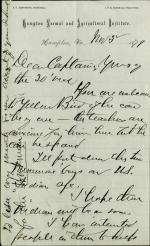
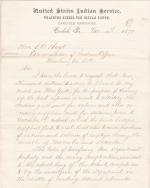
Richard Henry Pratt writes to Commissioner of Indian Affairs Ezra Hayt, requesting $4000 be transferred to his credit for the purposes of settling debts and paying owed salaries. A note in the file suggests that the Commissioner had a total of $7000 transferred into Pratt's account.
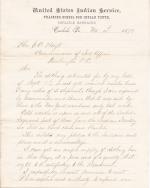
Richard Henry Pratt writes to Commissioner of Indian Affairs Ezra Hayt, requesting permission to spend $1000 on cold weather clothing for students. Pratt notes that supplies requested two months previous had not yet arrived, and that cold weather had set in at Carlisle.
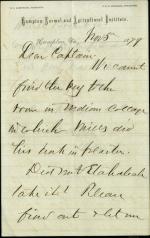
Samuel Chapman Armstrong of the Hampton Institute writes to Richard Henry Pratt inquiring whether Etadleuh still has the key to the Medium Cottage where Clark Mills took plaster casts of the heads of prisoners from Ft. Marion. Armstrong also discusses Hampton's capacity for Indian students.
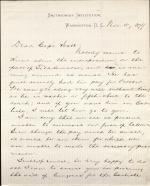
Spencer Fullerton Baird of the Smithsonian Institution writes to Richard Henry Pratt offering to transfer Tichkematse to Carlisle, and extends his support for Pratt's efforts at Carlisle in Congress.
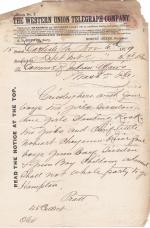
Telegram from Richard Henry Pratt noting the arrival of Agent Crissey with Sisseton, Standing Rock, and Cheyenne River Sioux children, Green Bay Menominee children, and Chief Little No Heart at Carlisle. Pratt suggests that all these children should be sent to the Hampton Institute.
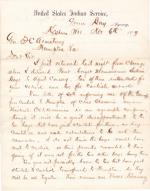
Richard Henry Pratt forwards to the Commissioner of Indian Affairs a letter, sent to General Samuel Armstrong of the Hampton Institute by Green Bay agent E. Stephens. Stephens requests that two students just sent to Carlisle, Joseph Wishecoppy [Wisecoby] and Moses Nonway, be sent to Hampton to join two other recently enrolled Menominee students…
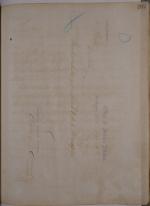
Telegram from Commissioner of Indian Affairs Ezra A. Hayt to Captain Richard Henry Pratt suggesting that he use his judgement about sending along to Hampton some of the students recently brought to Carlisle.
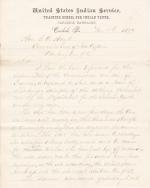
Richard Henry Pratt writes to Commissioner of Indian Affairs Ezra Hayt regarding the quality of clothing provided to Carlisle Indian School students. Pratt complains that the partial order of clothing he received from the Bureau is not durable or warm enough, and leaves students uncomfortable and discontent. Pratt requests that he be provided…
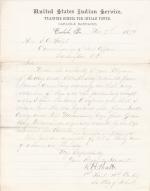
Richard Henry Pratt informs Commissioner of Indian Affairs Ezra Hayt that, at the request of Hampton Institute director General Samuel Armstrong, six Sisseton Sioux children and two Menominee boys from Green Bay, Wisconsin will be retained at Carlisle. Their addition increases the school's population to 158.
Note: The two Menominee…
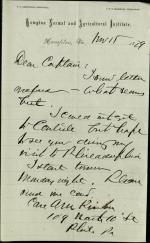
Samuel Chapman Armstrong of the Hampton Institute writes to Richard Henry Pratt to make arrangements for Armstrong to visit Carlisle while in Philadelphia.
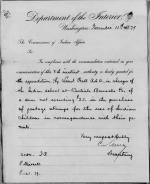
Secretary of the Interior Carl Schurz grants Richard Henry Pratt authority to purchase $25 of stamps for students to use to correspond with their parents.
Note: This item was copied from U.S. National Archives microfilm reels (M234), which were filmed from the original documents found in Record Group 75, Entry 79, "Letters Received by…
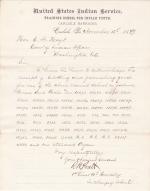
Richard Henry Pratt acknowledges receipt of numerous boxes of clothing and other supplies, including an organ for the chapel.
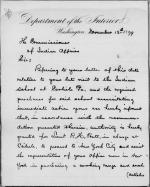
Secretary of the Interior Carl Schurz authorizes Richard Henry Pratt to visit New York City and spend $2,000 to purchase a cooking range, clothing, furniture, and supplies.
Note: This item was copied from U.S. National Archives microfilm reels (M234), which were filmed from the original documents found in Record Group 75, Entry 79, "…
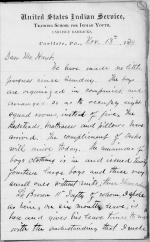
Richard H. Pratt provides updates on the progress he's made since Sunday. Most notably, Pratt has organized the male students into companies, and they now occupy eight rooms instead of five, the bedding has arrived, and they've started building the foundation for the chapel and assembly room.
Note: This item was copied from U.S. National…
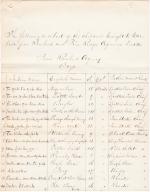
Captain Richard Henry Pratt writes to Ezra H. Hayt, Commissioner of Indian Affairs, regarding the first groups of Sioux, Menominee Ponca, Pawnee, Kiowa, Comanche, Wichita, Seminole, Cheyenne, and Arapaho children and young adults brought to the Carlisle Indian School. Pratt offers a detailed description of the journey, and then lists each…
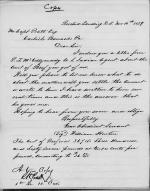
Richard Henry Pratt forwards two letters to Commissioner of Indian Affairs E. A. Hayt and gives his side of the story regarding a disagreement over the price of beef supplied for the students recruited for Carlisle while they waited at the Rosebud Agency. Included is a letter from William Huston to Pratt regarding how much beef Pratt bought…
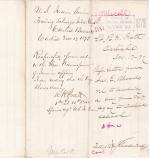
Richard Henry Pratt forwards to the Commissioner of Indian Affairs a letter, penned by James E. Rhodes of Germantown, Pennsylvania. Rhodes asks if the son of one of his Seneca friends, John Kennedy, might be allowed to enroll at Carlisle. Pratt notes that he is willing to accept the boy, if the Commissioner approves.
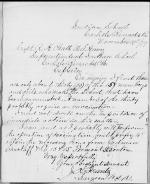
Surgeon J. H. Frantz informs Richard Henry Pratt that only 30 of the 158 students have been vaccinated. Pratt forwards Frantz's comments to the Commissioner of Indian Affairs and requests to purchase 140 vaccines.
Note: This item was copied from U.S. National Archives microfilm reels (M234), which were filmed from the original documents…
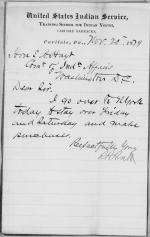
Richard H. Pratt notifies Commissioner of Indian Affairs E. A. Hayt that he's going to New York on Friday and Saturday to make purchases.
Note: This item was copied from U.S. National Archives microfilm reels (M234), which were filmed from the original documents found in Record Group 75, Entry 79, "Letters Received by the Office of…
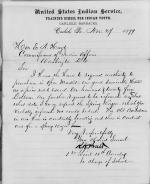
Richard Henry Pratt requests authority to purchase a horse and asks Commissioner of Indian Affairs E. A. Hayt when he's going to send him the spring wagon that he promised.
Note: This item was copied from U.S. National Archives microfilm reels (M234), which were filmed from the original documents found in Record Group 75, Entry 79, "…
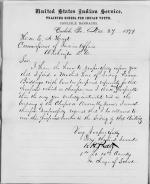
Richard Henry Pratt informs the Commissioner of Indian Affairs E. A. Hayt that he has found a method of siding frame buildings with lumber designed exclusively for that purpose and asks him if he can use this new lumber to build the chapel and assembly room.
Note: This item was copied from U.S. National Archives microfilm reels (M234),…
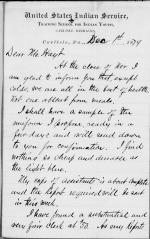
Richard Henry Pratt provides Commissioner of Indian Affairs E. A. Hayt with a variety of updates about the Carlisle Indian School: everyone is in good health, he will send Hayt a uniform sample in a few days, his corps of assistants is almost complete, he's found a clerk, he'd like to keep a former Carlisle Barracks employee on the staff for…
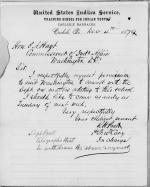
Richard Henry Pratt requests to visit Washington, D.C. to discuss the Carlisle Indian School with the Department of the Interior. A note on the bottom notes that Pratt has telegraphed to cancel the request to visit.
Note: This item was copied from U.S. National Archives microfilm reels (M234), which were filmed from the original…
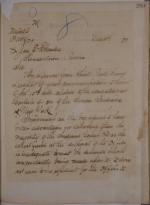
Commissioner of Indian Affairs Ezra A. Hayt's letter to James E. Rhoades in response to a letter Rhoades sent to Captain Richard Henry Pratt requesting that he transfer a Seneca student to the Carlisle Indian School. Hayt denied the request on the grounds that the Seneca student has "better advantages" than most Indians and that the office has…
